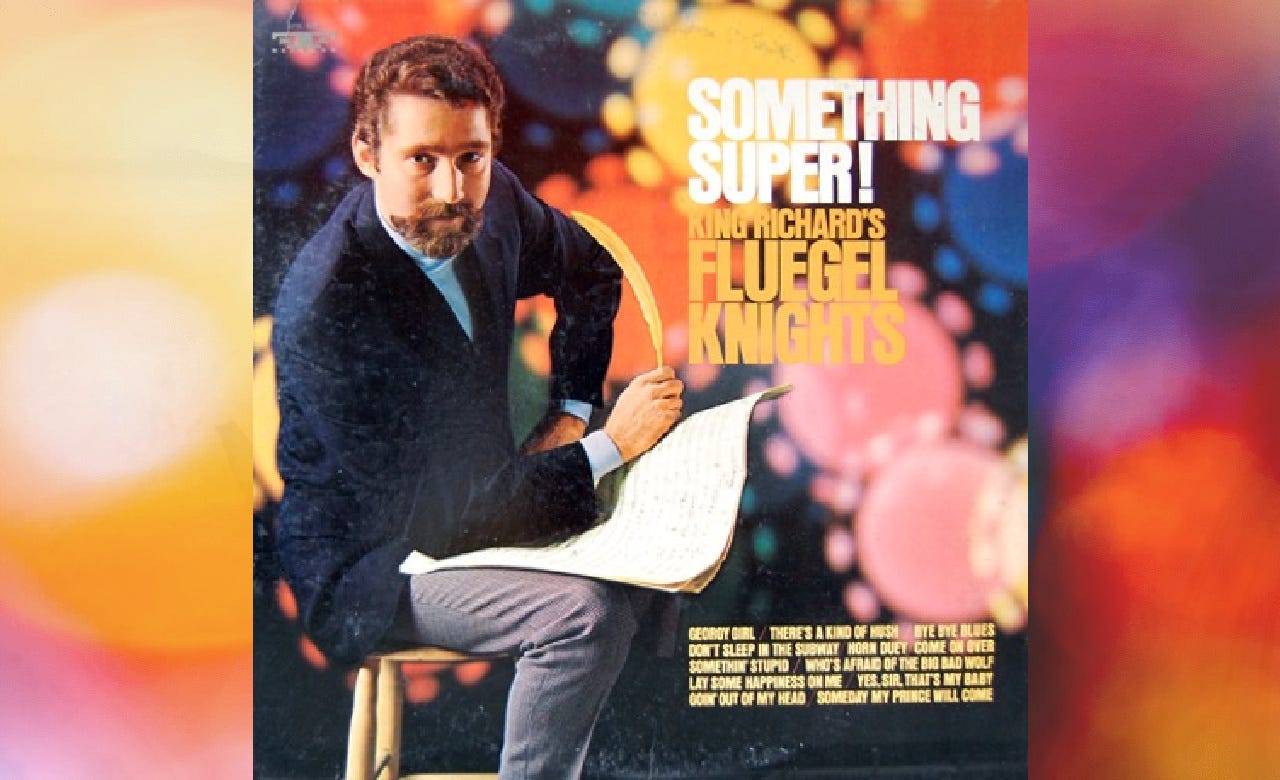A bit of information to get started. A flugelhorn is a brass instrument that resembles a trumpet or cornet, only considerably larger with a wider, more conical bore. That is to say the diameter of the lead pipe—the tube where the mouthpiece is inserted—is narrower at the opening vs. where it goes into the valve casing.
The German word Flügel means wing or flank in English—both precursors of the English term wanker. In early 18th century Germany, the man leading a ducal hunt leader was known as the Flügelmeister. Said individual blew a Flügelhorn, a large semicircular brass or silver valveless horn, to direct the wings, or flanks, of the hunt. Flügelmeister, who knew?
The sound of the flugelhorn is richer, darker, and mellower than the trumpet or cornet. Some describe it as a cross between the trumpet and French horn. The instrument has traditionally been part of British-style brass bands but has also long been used in jazz. As you may know, the jazz idiom ranges from the sublime to the ridiculous. A quick flugel google search yields the names of most of the big name jazz trumpet players from the 50’s on. Miles Davis used it on his album Sketches of Spain.
Then there’s Chuck Mangione. Now we’ve changed ledgers from the serious to precursors of Smooth Jazz. Mangione was an graduate from the jazz program at Eastman, the same lofty institution that gave us the group Blood, Sweat, and Tears. Both would go on to have successful careers. Chuck made his living penning 70s-light jazz tunes and playing the flugelhorn. He called it “the right baseball glove.” One of his tunes, Feels So Good, even cracked the charts, once again proving that top 40 radio is another opiate of the masses.
Mangione is just the tip of the tacky flugelhorn iceberg. The very nature of the flugel beast lends itself to all musical things smooth and lugubrious. Exhibit A, practically every Burt Bacharach tune ever written. Where would Burt—and Dionne Warwick—be without the mysterious mewlings of flugelhorns in the background? Decades later Burt would turn to the flugelhorn again on his brilliant album with Elvis Costello. Don’t get me wrong. I think Bacharach is a superb songwriter. But he must have felt like Bach, who was still writing insanely complex counterpoint when the times had moved on to the frilly nonsense of rococo. With Burt, it was continuing to write catchy 70s pop tunes when the musical world turned dark with the likes of disco and punk.
Mangione and Bacharach aren’t the only ones to shill the flugelhorn out. Every lame-ass writer and arranger from the 60s on has used it like Bondo on the dented fender of a Rambler American. Why? Because both the fill the cracks nicely. My favorite tacky example is from the mid-60s was a group called King Richard and Fluegel Knights.
I actually own a copy of the Fluegel Knight’s LP Something Super, pictured above. I inherited it from my Uncle Bill, my Dad’s brother. Martin and Bill didn’t get along. But they did tolerate each once at a rare Gaiser family reunion in Albuquerque. I was in grad school at the time. At the dinner, Bill and I actually had a long—and pleasant—conversation about classical music and opera. He told me he had a record collection from the 50s that he still listened too. And that he loved the Met opera recordings from the time. I thought he was a nice guy. How was it that he and Martin couldn’t get along? Until the next day when everyone discovered that Bill and his wife had left in the dark of night without telling a soul.
The following year Bill passed away. I learned through my Mom that he wanted me to have his LP collection. On a drive back to Michigan from New Mexico, Carla and I stopped in Kansas to visit his wife Lorraine. After a nice visit, she gave me his record collection of over 100 LP’s. All were in immaculate condition. In addition to the opera and symphony recordings, there were a few odd ducks like Percy Faith, Mantovani, and 1001 Strings. Also a record called Something Super by the King Richard and the Fluegel Knights.
Back to those very Fluegel Knights. Band leader Dick Behrke was a lifelong friend of Bobby Darin and eventually became the latter’s conductor and arranger. Behrke was thus no stranger to cranking out light, shallow tunes with a hook or two. I remember spinning Something Super the first time and being both enchanted and slightly appalled by the likes of Hey Georgie Girl, Something Stupid, and There’s a Kind of Hush.
After listening, I imagined Behrke’s aha moment of adding a couple of flugelhorns to a small studio combo. It must have been like Einstein getting bad gas after one too many schnitzengruben. But Behrke’s—and Einstein’s—theories both worked. Between 1966 and 1969, the Fluegel Knights scored six hit singles on the big charts. And though Albert and Dick are no longer with us, physicists are still pondering the mysteries of quantum mechanics. And record collectors are still listening to the Fluegel Knights and scratching themselves in various unmentionable places.
In the end, I will step to the fore to defend the flugelhorn. After all, I belong to the huge and cataphonic (cacophony crossed with catatonic) tribe of trumpet players that ranges from fourth grade head bangers to the lofty likes of the late Armando Ghitalla, Phil Smith, and Esteban Batallán. But we must defend our tribe. It’s no fault of ours that one of our brethren keeps getting tossed into the La Brea Tar Pits of popular music. Then again, a gig is a gig. And if you listen carefully, you can almost hear a kind of hush come over the world.
Enjoyed this post?
My new book, “Strong Water,” will be released in the coming weeks.
Sign up for my newsletter to be notified when it goes live. Click here.






I have a fondness for some of the old smooth stuff,for instance,I have a Si Zentner album which is hard to beat.It's like the ElectraGlide transmission of brass playing. The recent champ of the flugelhorn in the classical niche is Sergei Nakariakov. he had one made for him and plays stuff that should be impossible and the sound,although dark and rich,is not "foofy' like it is with many who tackle the instrument. he has core to every note. The only time I ever used it professionally was on a soundtrack for a film about the Inuits, an avant garde score by Stefan Hakenberg.That was a trial as I so rarely played it. it was like taking grandma's Chrysler through a cornfield. By the way,that album you just exposed us to is a prime example of what I call Accidental Surrealism, some of the irony and paradox, minus the ideology.By the way,you're the expert. What wine goes with flugelhorn?
Tim, I'm a flugelhorn fan, I mean, come on, it's a trumpet with nice manners. Mangione got me into it in a different kind of way; it was Gerry Niewood his late, great, his sax player who made the connection. And Ester Satterfield. God, she has a voice! It's that sweet tone. Kath was an alto sax and flute player when I first met her in 1975; our musical tastes kept expanding from there. We heard Mangione's Orchestra in S.F., at the Great American Music Hall ( where we also heard, at different times; Maynard Fergeson, Count Basie, and Taj Mahal, with a Howard Johnson led tuba section- Taj was playing with a big and, Rudy Costa his reed player- awesome band!) Kath and I would hit Keystone Corner; Yusef Lateef, Richie Cole......